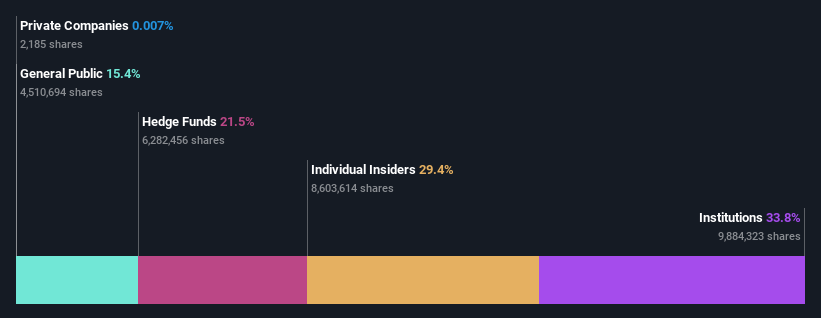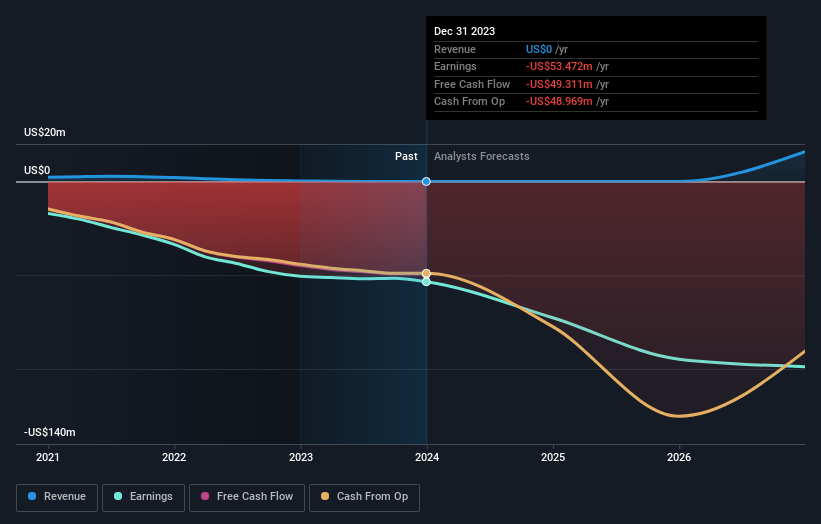Stock Analysis
- United States
- /
- Biotech
- /
- NasdaqGM:IMRX
Immuneering Corporation's (NASDAQ:IMRX) latest 57% decline adds to one-year losses, institutional investors may consider drastic measures

Key Insights
- Institutions' substantial holdings in Immuneering implies that they have significant influence over the company's share price
- 54% of the business is held by the top 5 shareholders
- Insider ownership in Immuneering is 29%
Every investor in Immuneering Corporation (NASDAQ:IMRX) should be aware of the most powerful shareholder groups. With 34% stake, institutions possess the maximum shares in the company. Put another way, the group faces the maximum upside potential (or downside risk).
And so it follows that institutional investors was the group most impacted after the company's market cap fell to US$172m last week after a 57% drop in the share price. Needless to say, the recent loss which further adds to the one-year loss to shareholders of 63% might not go down well especially with this category of shareholders. Often called “market movers", institutions wield significant power in influencing the price dynamics of any stock. As a result, if the decline continues, institutional investors may be pressured to sell Immuneering which might hurt individual investors.
Let's take a closer look to see what the different types of shareholders can tell us about Immuneering.
Check out our latest analysis for Immuneering

What Does The Institutional Ownership Tell Us About Immuneering?
Many institutions measure their performance against an index that approximates the local market. So they usually pay more attention to companies that are included in major indices.
We can see that Immuneering does have institutional investors; and they hold a good portion of the company's stock. This suggests some credibility amongst professional investors. But we can't rely on that fact alone since institutions make bad investments sometimes, just like everyone does. If multiple institutions change their view on a stock at the same time, you could see the share price drop fast. It's therefore worth looking at Immuneering's earnings history below. Of course, the future is what really matters.

It looks like hedge funds own 21% of Immuneering shares. That worth noting, since hedge funds are often quite active investors, who may try to influence management. Many want to see value creation (and a higher share price) in the short term or medium term. Our data shows that Cormorant Asset Management, LP is the largest shareholder with 14% of shares outstanding. For context, the second largest shareholder holds about 13% of the shares outstanding, followed by an ownership of 12% by the third-largest shareholder. Benjamin Zeskind, who is the second-largest shareholder, also happens to hold the title of Chief Executive Officer.
Our research also brought to light the fact that roughly 54% of the company is controlled by the top 5 shareholders suggesting that these owners wield significant influence on the business.
While it makes sense to study institutional ownership data for a company, it also makes sense to study analyst sentiments to know which way the wind is blowing. There are plenty of analysts covering the stock, so it might be worth seeing what they are forecasting, too.
Insider Ownership Of Immuneering
The definition of company insiders can be subjective and does vary between jurisdictions. Our data reflects individual insiders, capturing board members at the very least. Company management run the business, but the CEO will answer to the board, even if he or she is a member of it.
Insider ownership is positive when it signals leadership are thinking like the true owners of the company. However, high insider ownership can also give immense power to a small group within the company. This can be negative in some circumstances.
It seems insiders own a significant proportion of Immuneering Corporation. Insiders own US$51m worth of shares in the US$172m company. We would say this shows alignment with shareholders, but it is worth noting that the company is still quite small; some insiders may have founded the business. You can click here to see if those insiders have been buying or selling.
General Public Ownership
The general public, who are usually individual investors, hold a 15% stake in Immuneering. This size of ownership, while considerable, may not be enough to change company policy if the decision is not in sync with other large shareholders.
Next Steps:
While it is well worth considering the different groups that own a company, there are other factors that are even more important. For instance, we've identified 5 warning signs for Immuneering (3 don't sit too well with us) that you should be aware of.
If you would prefer discover what analysts are predicting in terms of future growth, do not miss this free report on analyst forecasts.
NB: Figures in this article are calculated using data from the last twelve months, which refer to the 12-month period ending on the last date of the month the financial statement is dated. This may not be consistent with full year annual report figures.
Valuation is complex, but we're helping make it simple.
Find out whether Immuneering is potentially over or undervalued by checking out our comprehensive analysis, which includes fair value estimates, risks and warnings, dividends, insider transactions and financial health.
View the Free AnalysisHave feedback on this article? Concerned about the content? Get in touch with us directly. Alternatively, email editorial-team (at) simplywallst.com.
This article by Simply Wall St is general in nature. We provide commentary based on historical data and analyst forecasts only using an unbiased methodology and our articles are not intended to be financial advice. It does not constitute a recommendation to buy or sell any stock, and does not take account of your objectives, or your financial situation. We aim to bring you long-term focused analysis driven by fundamental data. Note that our analysis may not factor in the latest price-sensitive company announcements or qualitative material. Simply Wall St has no position in any stocks mentioned.
About NasdaqGM:IMRX
Immuneering
Immuneering Corporation, a clinical-stage oncology company, engages in the development of medicines for broad populations of cancer patients.
Flawless balance sheet and slightly overvalued.

